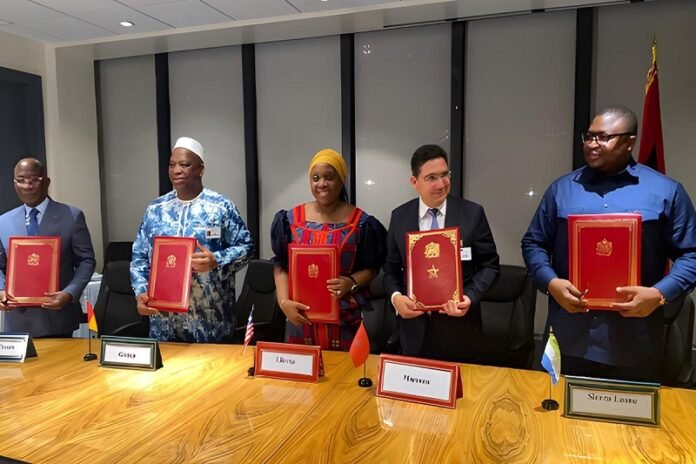Morocco and the Sahel Initiative: Opening New Horizons
In New York, on the sidelines of the 79th session of the United Nations General Assembly, Morocco’s Foreign Minister Nasser Bourita met with his counterparts from the African Sahel countries (Mali, Niger, Burkina Faso, and Chad) to discuss King Mohammed VI’s initiative to enhance these nations’ access to the Atlantic Ocean.
This initiative represents an important step in supporting the economies of these landlocked countries, which face significant economic challenges. It grants them the opportunity to diversify their economic resources and engage in global trade.
Key points of the Follow-up Meeting on Operationalization of Royal Initiative to Promote Access of Sahel Countries to Atlantic Ocean pic.twitter.com/O4sRhIwly9
— Moroccan Diplomacy 🇲🇦 (@Marocdiplo_EN) September 28, 2024
Malian Foreign Minister Abdoulaye Diop emphasized the importance of this initiative, describing it as “strategically very important.” But the question arises: how will the Sahel countries be able to capitalize on this access to the Atlantic to strengthen their economies and address the developmental challenges they face? The answer to this question requires considering the logistical, financial, and political challenges surrounding this ambitious project, as well as the need for close coordination between Morocco and the Sahel countries to achieve the desired goals.
Roadmap with the Mano River Union: Expanding Partnerships
On another front, Morocco signed a significant agreement with the countries of the Mano River Union (Côte d’Ivoire, Guinea, Liberia, and Sierra Leone), aiming to strengthen cooperation in the fields of economy, investment, security, education, and vocational training. This agreement is part of Morocco’s strategy to expand its influence in Africa beyond its traditional relations with West African countries like Senegal and Gabon.
Political analyst Mohamed Chakir sees this move as part of Morocco’s expansion in its relations with new African countries outside its traditional sphere of influence. He adds that Morocco has played a key role in ending conflicts in the region, as demonstrated by its mediation between Sierra Leone and Liberia in 2002, which contributed to restoring peace and trust between the two countries.
Moroccan Diplomacy: A Win-Win Strategy
Morocco’s partnerships with the Sahel countries and the Mano River Union are part of a larger vision based on the principle of “win-win.” Morocco has established itself as a gateway to Africa through development initiatives such as the Atlantic initiative to strengthen the Sahel countries’ access to the Atlantic Ocean, underscoring Morocco’s importance in boosting trade and economic relations between North and West Africa.
Challenges and Opportunities
Despite the warm reception of Moroccan initiatives in Africa, Morocco faces significant challenges in implementing these ambitious agreements. Morocco, the Sahel countries, and the Mano River Union will need to mobilize the necessary financial and human resources to achieve their shared goals. The question here is: will Morocco be able to provide the necessary support to ensure the sustainable implementation of these projects? This question calls for an examination of partnerships with the international community and financial institutions to support these efforts.
Morocco as a Regional and International Actor
Through these agreements and initiatives, Morocco strengthens its position as a key regional player in Africa. The expansion of partnerships, both with the Sahel countries and the Mano River Union, reflects King Mohammed VI’s vision of promoting South-South cooperation as one of the core pillars of Morocco’s strategy on the continent. This movement represents an opportunity to enhance stability and development in regions facing security issues and economic challenges.
Future Outlook
The future of relations between Morocco, the Sahel countries, and the Mano River Union will largely depend on the ability of the concerned parties to overcome challenges and implement these projects effectively. While the Sahel countries and the Mano River Union look to benefit from Morocco’s experience in development and reform, the central question remains: to what extent will Moroccan-African cooperation contribute to achieving sustainable and inclusive development that strengthens stability and prosperity in the region?
In conclusion, Morocco’s initiatives in Africa represent an innovative model of regional cooperation based on mutual benefits and respect, a model that could be a significant source of development and peace in Africa.


